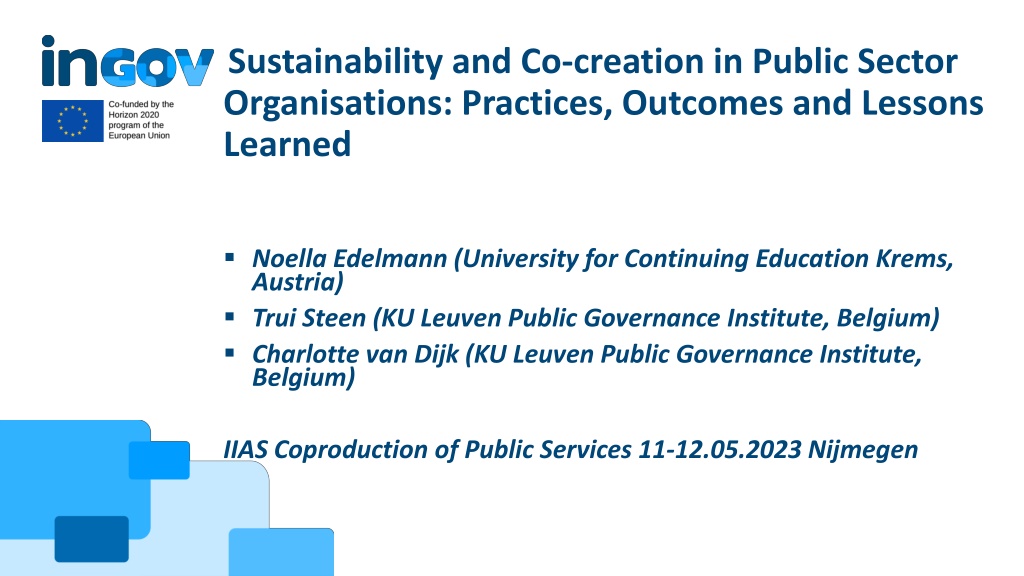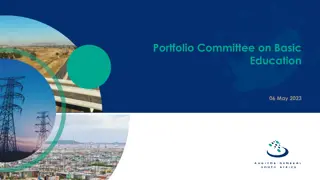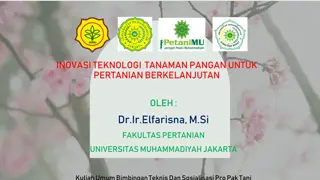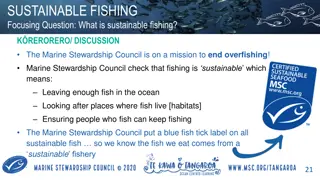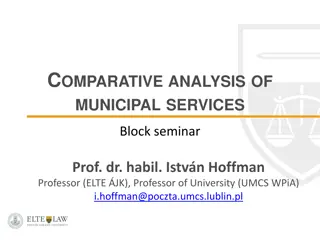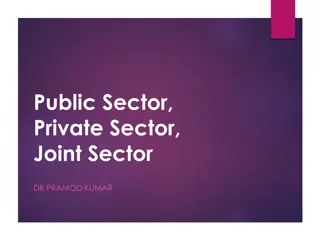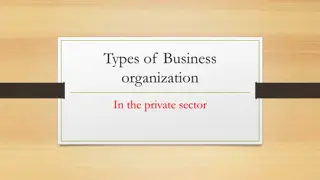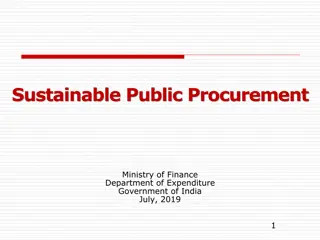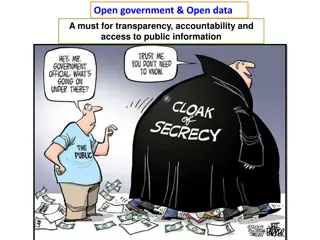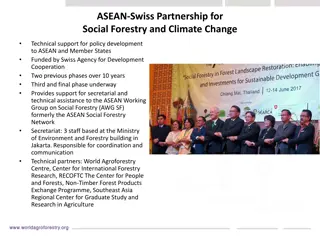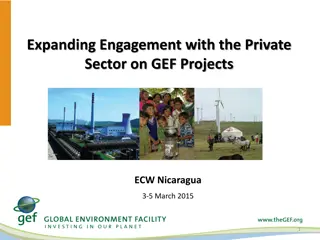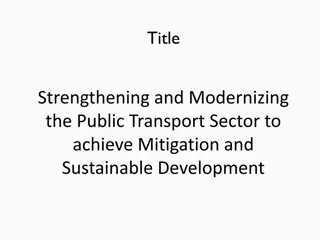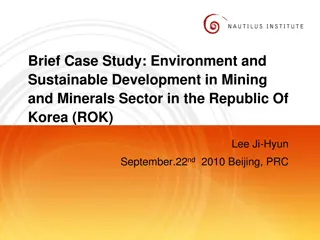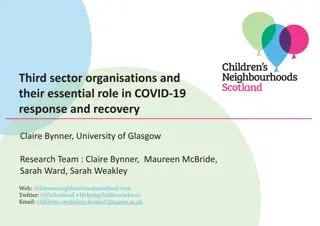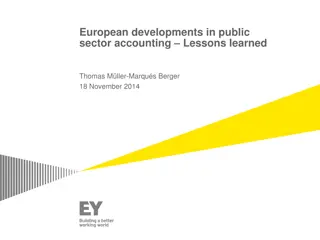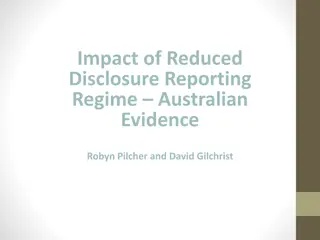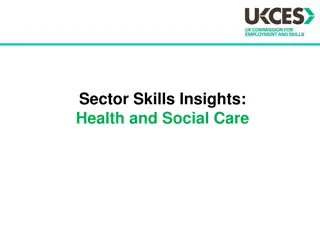Sustainable Co-creation in Public Sector Organizations: Insights and Practices
Exploring sustainability and co-creation in public sector organizations, this research delves into defining sustainability indicators and best practices in co-creation. With a focus on the H2020 inGOV project, the study examines sustainable processes, outcomes, and the role of ICT tools. Insights from the study highlight the importance of stakeholder involvement, governance models, and policy recommendations for integrated public service co-creation. The discussion revolves around how organizations contribute to societal well-being, emphasizing transparency, benchmarking, and stakeholder engagement.
Download Presentation

Please find below an Image/Link to download the presentation.
The content on the website is provided AS IS for your information and personal use only. It may not be sold, licensed, or shared on other websites without obtaining consent from the author. Download presentation by click this link. If you encounter any issues during the download, it is possible that the publisher has removed the file from their server.
E N D
Presentation Transcript
Sustainability and Co-creation in Public Sector Organisations: Practices, Outcomes and Lessons Learned Noella Edelmann (University for Continuing Education Krems, Austria) Trui Steen (KU Leuven Public Governance Institute, Belgium) Charlotte van Dijk (KU Leuven Public Governance Institute, Belgium) IIAS Coproduction of Public Services 11-12.05.2023 Nijmegen
Overview Background Context: H2020 inGOV project Sustainable co-creation: sustainable co-creation processes or co-created sustainable outcomes? Sustainability in the public sector? o o o Research questions 1. 2. How can sustainability in the public sector be defined and what indicators can be used to measure it? What are the best practices and outcomes associated with sustainable co-creation in the public sector? Conclusion and next steps: measuring sustainability?
H2020inGOV: IPS, co-creation, sustainability IPS Co-creation Conceptual models IPS co-creation model IPS Values & Principles PS co-creation model ICT Architecture and Tools IPS Holistic Framework IPS Governance IPS Reference Architecture Mobile Platforms and Tools Visual Assistants IPS Agreements Stakeholders Involvement Implementation Guidelines Knowledge Graphs & Semantics Agile Roadmap Stakeholder Input Pilots and Evaluation Sustainability & Policy Recommendations Evaluation Plan Sustainability Plan Policy Recommendations Impact and Gains Principles reinforcement Efthimios Tambouris and Konstantinos Tarabanis (2021) Inclusive Governance Models and ICT Tools for Integrated Public Service Co-Creation and Provision: The inGov project , 22ndAnnual International Conference on Digital Government Research (dg.o 2021), ACM, pp. 538-539.
Sustainability: the private sector [ ] a relative concept in that it describes the planned and strategic management processes involved in working toward a balance of economic, social, and environmental goals and values. Moreover, [it] is often seen as an umbrella term for various other concepts that, in one way or the other, all refer to the role of business in society (Thomsen, 2018; p. 4). How organisations contribute to the well-being and quality of life of society and individuals in current and future generations. To minimise the potential for a product to be harmful, fulfil customers needs, and generate employment or wealth in different social environments. Benchmarking against other organisations: leading organisation in society, to support transparency and external auditing, and fostering change within the organisation To engage stakeholders and to overcome resistance to organisational change
Sustainability Sustainability in the European public sector is aligned with digital transformation > e.g. Berlin Declaration (2020) Ensuring that digital transformation contributes to Sustainable Development Goals (SDGs); Develop policies that support a workplace culture and appropriate use of digital technologies through co-creation and collaboration with the civil society; Deepen collaboration; But also in terms of climate change and digital transformation >e.g. Shaping Europe s digital future (2020) Digital solutions and data are to enable a fully integrated life-cycle approach that supports an open, democratic and sustainable society Contribute to a sustainable, climate-neutral and resource-efficient economy;
Sustainability: the public sector Environment and climate change (United Nations, 2015) Sustainable Development Goals Use of ICT to align the efficiency of internal government operations with sustainable development-oriented ICT strategies, processes, architectures and infrastructures (Janowski and Estevez) Financial aspects and compliance with standards and stakeholders requirements (Zuo, Jin, and Flynn, 2012) Management, strategic planning and organisational change (Jaspers & Steen, 2019) Sustainability, in terms of climate aims as well as digital transformation, involves identifying technology needs and gaps, supporting innovation, capacity-building, technology development and dissemination.
Co-creation A process through which two or more public and private actors [to] solve a shared problem, challenge, or task through a constructive exchange of different kinds of knowledge, resources, competences, and ideas that enhance the production of public value [...], or services, either through a continuous improvement of outputs or outcomes or through innovative step-changes that transform the understanding of the problem or task at hand and lead to new ways of solving it. (Torfing et. al., 2019; p.802). ] Co-creation can lead to a higher level of user acceptance and plausibility of services and technologies, leading to more sustainable public service provision Through co-creation, the sustainability of collaborative practices can be strengthened How co-creation enables the creation of effects that endure, even after the co-creation activity itself has come to an end (Jaspers & Steen 2021) > Sustainable co-creation processes > Co-creation of sustainable outcomes
Results: Defining Sustainability in the public sector Taking into account that sustainability can be understood as meeting the needs of the present without compromising the ability of future generations to meet their own needs, sustainability should not only be about environmental and social impacts, but be a concept that can be adapted to different contexts, retains its value over time, leads to new ways of working in the organization, and should include any artefacts (products, services) created for the long-term. Thus, sustainable processes and outcomes are those that have long- term benefits.
technical human resources legal organisational processes outcomes sustainability >technical >organizational >human resources >ownership >legal >new ways of working >technical context >organisational context >human resources >dimensions of the artefact >legal framework > preservation strategy > open >re-usable and adaptable >long-term
Results: 9 best practices 1.Definition of the target audience to be reached 2.Managing knowledge and communication 3.Establishing a context for participation 4.Channels and tools selected 5.Processes are financed and financially viable (apriori) 6.Technical tools 7.Multilingual tools 8.Local context 9.Failures and risks
Next steps 1.Is the definition useful? 2.Testing indicators: Do they help measure sustainable processes and outcomes? Workshop and questionnaire June 2023 Applicability to other co-creation projects?
Thank you! Contact: Noella Edelmann Noella.Edelmann@donau-uni.ac.at More information: www.ingov-project.eu This work was funded by the European Commission, within the H2020 Programme, in the context of the project inGov (https://ingov-project.eu/) under Grant greement Number 962563. 9.3.2024.
